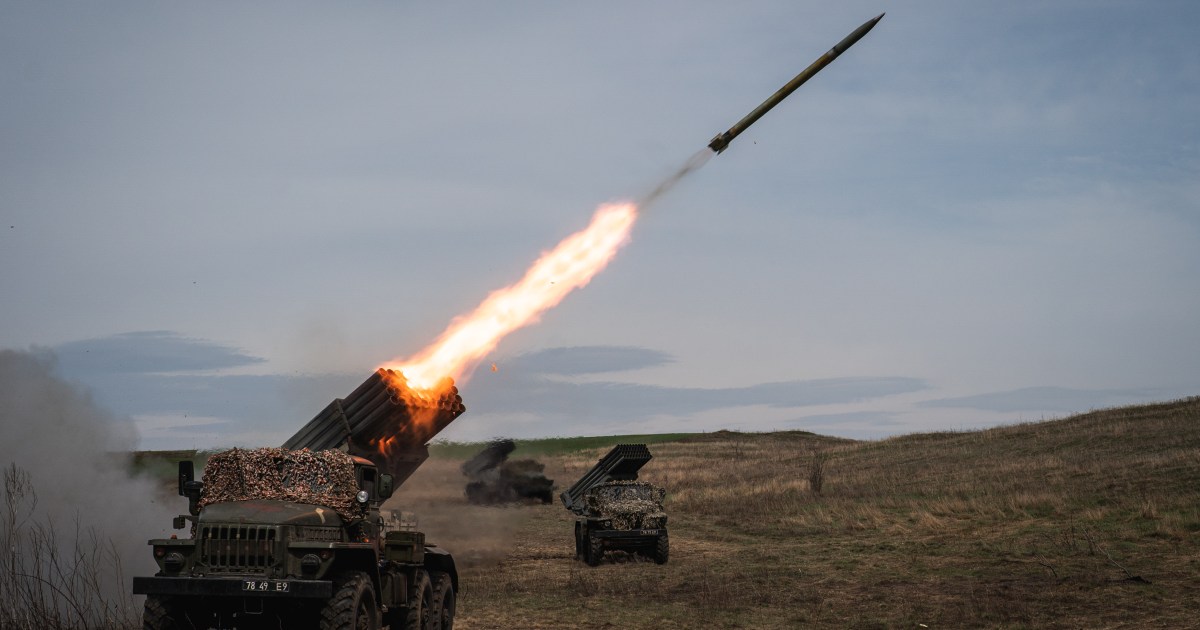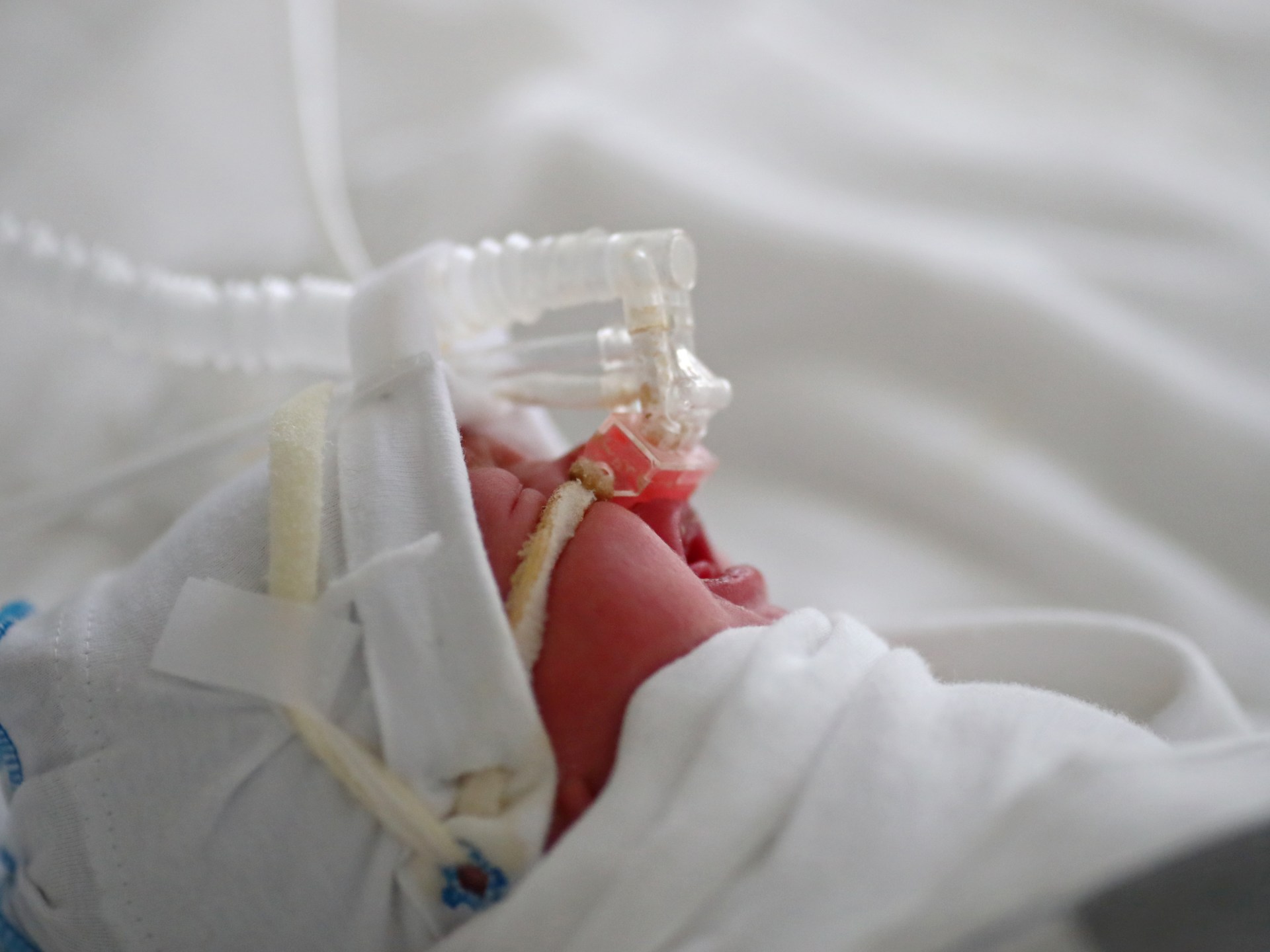Timeline: Week seven of Russia’s war in Ukraine
Russia has lined up more firepower ahead of a potential showdown in eastern Ukraine that could start within days.
Moscow is refocusing its military offensive on the Donbas, which comprises Ukraine’s regions of Luhansk and Donetsk, after facing stiff resistance and battlefield setbacks in other parts of the country, including around Kyiv.
Russian President Vladimir Putin controversially recognised the independence of the Luhansk and Donetsk regions, calling them historical Russian lands, just days before launched his invasion of Ukraine on February 24.
Here, Al Jazeera looks at the major events that marked the seventh week of the war in Ukraine:
April 6
Ukrainian authorities advise residents of the eastern Luhansk and Donetsk regions to evacuate “while it is safe”, in expectation of a major military offensive aimed at completing Russia’s conquest of the two regions.
The government tries to evacuate people along 11 humanitarian corridors. These are not deemed entirely safe.
Ukrainian authorities say the eastern town of Izium is completely under Russian control.
US President Joe Biden issues an executive order subjecting Russia to new sanctions for its invasion of Ukraine. United States citizens are prohibited from investing in Russia, financing activities there by third-country nationals or exporting services to Russia.
The sanctions also target Russian President Vladimir Putin’s two daughters. US officials say they believe the daughters are holding much of Putin’s personal wealth.
US Treasury Secretary Janet Yellen says the Group of 20 – the G20 or world’s 20 largest economies – should expel Russia, and that the US will boycott certain G20 meetings if Russian officials attend.
The European Commission says it has begun a 540-million-euro (almost $590m) strategic stockpile of medicine and equipment to combat chemical, biological, radiological and nuclear threats. The Commission mentions the possibility of radioactive substance leaks and terrorist attacks, but not a possible attack by Russia.
Hungary becomes the first European Union member to agree to purchase Russian gas in roubles, as decreed by Putin on March 31.
NATO Secretary-General Jens Stoltenberg says the alliance would welcome Sweden and Finland if they decided to apply for membership.
April 7
Ukrainian authorities say Russia fired a cluster munition into a railway station packed with thousands of evacuees, killing at least 52 people. The attack takes place in the city of Kramatorsk in the eastern Donetsk region.
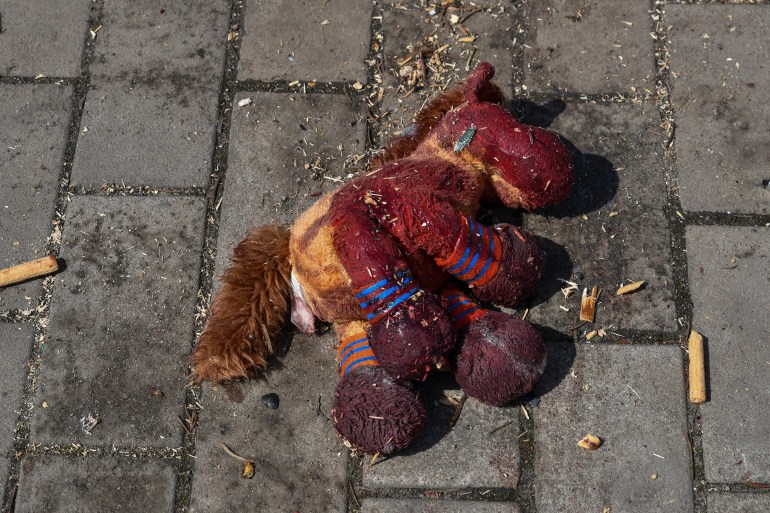
Addressing the Greek parliament virtually, Ukrainian President Volodymyr Zelenskyy calls for tougher European sanctions against Russia.
Some NATO members say they will step up deliveries of weapons to Ukraine, during a foreign ministers’ meeting in Brussels. Ukrainian Foreign Minister Dmytro Kuleba tells the gathering that Ukraine needs the extra weapons in “days, not weeks”.
The United Nations General Assembly votes to suspend Russia from the organisation’s Human Rights Council. Ninety-three nations voted in favour of suspension, 24 voted against, and 58 abstained.
April 8
Ukraine says it has repelled Russian attacks in the east of the country, destroying nine tanks, seven armoured vehicles and two helicopters.
Forensic experts start exhuming bodies from mass graves in the town of Bucha, northwest of Kyiv.
Visiting the site, European Commission President Ursula von der Leyen calls the killings of civilians “unthinkable”. In Kyiv, she hands Zelenskyy a questionnaire starting off the beginning of Ukraine’s EU membership application process.
The European Union bans imports of Russian coal in reaction to Russia’s apparent slaughter of civilians in Bucha.
The ban, which begins in August, will deprive Russia of 8 billion euros (around $8.7bn) in revenue annually.
As part of this fifth round of sanctions against Moscow, the EU also bans imports of Russian lumber, cement, seafood and fertilisers.
Russian-flagged ships are also banned from the EU’s ports and Russian-registered transport vehicles from its roads. The Russian customs service says some of its vehicles are barred from entering EU territory on the same day.
The EU also bans the export to Russia of jet fuel and sensitive technologies and software.
Four Russian banks already removed from the Society for Worldwide Interbank Financial Telecommunication (SWIFT) interbank transaction system have their assets frozen. Two hundred and seventeen Russian oligarchs are added to a list of sanctioned individuals, bringing the total to 1,091.
Von der Leyen says the EU is looking into blocking imports of Russian oil next.
The Kremlin says its invasion of Ukraine could end “in the foreseeable future”.
April 9
British Prime Minister Boris Johnson makes a surprise visit to Kyiv, promising Zelenskyy anti-ship missiles and armoured vehicles.
“Ukraine can never be bullied again, never will be blackmailed again, never will be threatened in the same way again,” Johnson said.
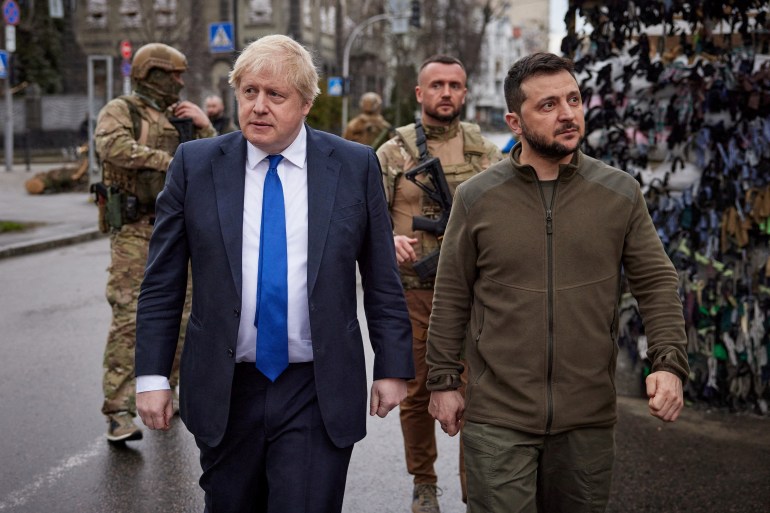
Zelenskyy also meets with Austrian Chancellor Karl Nehammer in Kyiv, and warns that a difficult battle lies ahead.
“This will be a hard battle. We believe in this fight and our victory. We are ready to simultaneously fight and look for diplomatic ways to put an end to this war,” Zelenskyy says.
A fundraiser organised by Canada and the EU raises 10.1 billion euros ($11bn) for internally displaced Ukrainians and those who have fled the country as refugees.
April 10
Russian missiles strike the airport in the city of Dnipro, utterly destroying it, the regional governor says.
Local officials say they have discovered a new mass grave in Buzova, a town 30km west of Kyiv, following the withdrawal of Russian forces.
The Institute for the Study of War, a think-tank, says Russian forces have bisected Mariupol, splitting its Ukrainian defenders into two groups. One group is now in the Azovstal steel plant in the city’s east, and another in the main port in the southwest.
The World Bank says the economies of Europe and Central Asia will contract by 4.1 percent this year due to the war in Ukraine, a recession twice as deep as that caused by COVID-19 in 2020.
Ukraine’s economy will shrink by almost half – 45 percent – and Russia’s economy will contract by 11.2 percent, the bank says.
Ukraine is worst affected because half of its businesses are closed and about half its exports are blocked from the Black Sea. The World Bank has provided Ukraine with $923m in loans and grants, and is preparing a further aid package of $1.5bn.
April 11
President Zelenskyy tells Al Jazeera that Ukrainian forces entrenched in the port areas of Mariupol will make a last stand for the city, even though Russian forces have now taken the centre.
“Capturing the city would mean our forces surrendering the weapons. But today … our soldiers are fighting until the very end, and they’re not willing to surrender,” Zelenskyy says in an exclusive interview with the network.
Ukraine’s defence ministry says Russia has completed its build-up of forces in the eastern Donetsk and Luhansk regions, of which Mariupol is a part.
“We forecast that active combat will begin in these areas in the nearest time,” Defence Ministry Spokesman Oleksandr Motuzyanyk said, adding that Ukraine’s army was ready to face the renewed assault.
Russia says its air strikes have destroyed four S-300 anti-air missile launch vehicles stationed on the outskirts of the city of Dnipro.
Unnamed officials tell The Times that Finland and Sweden plan to join the NATO alliance as early as June, in response to Russia’s invasion of Ukraine. The two countries were granted “enhanced information exchange” rights on February 25, a day after Russia launched full-scale war on Ukraine.
Sweden’s ruling Social Democrats say they are reconsidering their long-held position in favour of neutrality. Polls show that support for NATO membership has doubled in both countries, to 50 percent in Sweden, and to about 68 percent in Finland.
Zelenskyy asks South Korea for weapons, in his latest in a string of appeals for assistance to national parliaments around the world.
Austrian Chancellor Nehammer says he has “no optimistic information to bring you” after meeting with Putin in Moscow.
“The conversation with President Putin was very direct, open and tough,” Nehammer said, adding that he had raised the issue of Russian war crimes against civilians in Bucha and elsewhere.
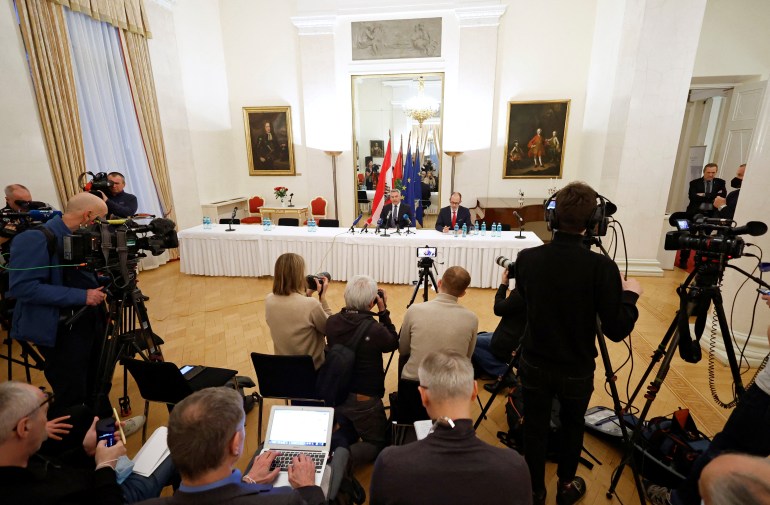
April 12
Ukraine’s security services say they have captured Putin ally Viktor Medvedchuk, who leads a pro-Russian political party called Opposition Platform–For Life.
“Pro-Russian traitors and agents of the Russian intelligence services, remember – your crimes have no statute of limitations,” Ukraine’s security service posts on Facebook alongside a photo of Medvedchuk in handcuffs.
Putin says Russia “had no other choice” but to launch what he calls a “special military operation” in Ukraine, to protect the rights of the Russian minority there and to ensure Russia’s own security.

